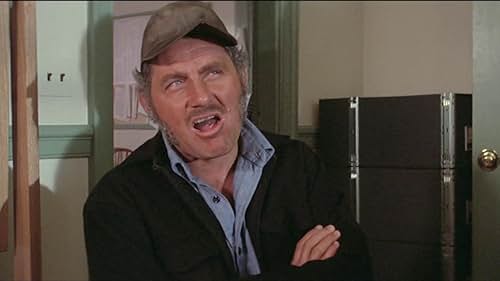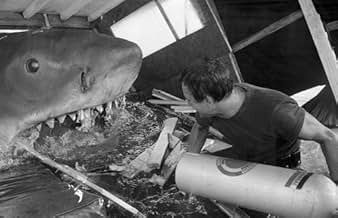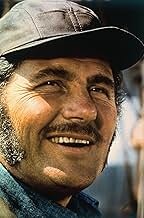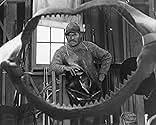
174101
This video file cannot be played.(Error Code: 224003)
Play trailer1:08
174101
When a massive killer shark unleashes chaos on a beach community off Long Island, it's up to the local police chief, a marine biologist, and an old seafarer to hunt the beast down.When a massive killer shark unleashes chaos on a beach community off Long Island, it's up to the local police chief, a marine biologist, and an old seafarer to hunt the beast down.When a massive killer shark unleashes chaos on a beach community off Long Island, it's up to the local police chief, a marine biologist, and an old seafarer to hunt the beast down.
IN THEATERS
- Won 3 Oscars
- 16 wins & 20 nominations total
Jeffrey Kramer
- Hendricks
- (as Jeffrey C. Kramer)
Robert Nevin
- Medical Examiner
- (as Dr. Robert Nevin)
Tim Aguirre
- Infant on Beach
- (uncredited)
Summary
Reviewers say 'Jaws' is acclaimed for revolutionizing the film industry with its summer blockbuster concept. It is praised for suspenseful storytelling, practical effects, and John Williams' iconic score. Central themes include fear, survival, and nature versus human ambition. Performances by Roy Scheider, Richard Dreyfuss, and Robert Shaw are lauded for depth and chemistry. However, some find the first half slow and shark effects dated, though the second half's tension is celebrated. 'Jaws' is noted for its cultural impact and cinematic legacy.
Featured reviews
10zkonedog
Reputationally-speaking, "Jaws" will forever be known for two things: director Steven Spielberg's unique "shark-eye view" camera work and building of suspense, and composer John Williams' two note "attack" motif that became as iconic as any piece of music ever created. Perhaps those two aspects alone would have been enough to make "Jaws" an iconic film--who knows. But the fact is, this 1975 effort is about so much more than just suspense/horror. It is one of the most well-rounded, complete movies ever made.
For a very basic overview, "Jaws" tells the story of the coastal town of Amity, which suddenly and inexplicably becomes the hunting grounds for a rogue Great White shark. Sheriff Brody (Roy Scheider) wants to close down the beaches until further notice, but is opposed every step of the way by city official Vaughn (Murray Hamilton), who worries about the potential loss of tourist business. When the attacks continue, however, Brody enlists the help of shark expert Hooper (Richard Dreyfuss) and grizzled boatsman Quint (Robert Shaw) to help hunt down the giant predator.
As stated, the general premise and music here are well-known. But what always strikes me with each "Jaws" re-watch is how much it is a human drama as opposed to a horror piece driven by a villain (the shark, in this case).
The first half of "Jaws" takes place almost entirely "on land", if you will, and focuses more on the politics of fear and commerce than anything supernatural or scary. If there are ever any doubts as to whether that material holds up, they can easily be put to rest after viewing the film through a pandemic context. Substitute "global contagious disease" for "mindless, unstoppable shark" and it's as relevant today as ever.
The second half leans more towards "adventure sea chase", and is buoyed by ocean scenes that, despite being filmed 45+ years ago now, do not seen old or outdated in the least. Masterful cinematography almost always holds up, and Spielberg's behind-the-camera decisions certainly do here as well. Even then though, in the midst of a brutal and thrilling chase, Spielberg stops the action for a touching scene in which the three seaman bond over song and shared experiences.
In order to fully exhibit such depth of character, great acting is required--and given here in spades. "Jaws" features a collection of unique characters that are always a joy to revisit. Scheider as the "why-won't- anyone-listen-to-me!" sheriff lets viewers relate to the story in a much more personal aspect, while Dreyfuss' Hooper is insightful, hilarious, and provides some of the best dialogue of the whole show. Of course, Shaw as Quint is singularly iconic, juxtaposing jocularity and complexity perfectly within his single character.
Perhaps the greatest compliment I can give "Jaws" is that every time I see it, I can't help but be swept away in all its winning aspects. Whether it be the drama, emotion, music, thrills, adventure, visuals, acting, or just overall heart of the piece, there is not a single scene wasted or underutilized. I have absolutely no doubt that it will remain just as visceral of an experience going forward as it was for those sitting in the theaters in 1975.
For a very basic overview, "Jaws" tells the story of the coastal town of Amity, which suddenly and inexplicably becomes the hunting grounds for a rogue Great White shark. Sheriff Brody (Roy Scheider) wants to close down the beaches until further notice, but is opposed every step of the way by city official Vaughn (Murray Hamilton), who worries about the potential loss of tourist business. When the attacks continue, however, Brody enlists the help of shark expert Hooper (Richard Dreyfuss) and grizzled boatsman Quint (Robert Shaw) to help hunt down the giant predator.
As stated, the general premise and music here are well-known. But what always strikes me with each "Jaws" re-watch is how much it is a human drama as opposed to a horror piece driven by a villain (the shark, in this case).
The first half of "Jaws" takes place almost entirely "on land", if you will, and focuses more on the politics of fear and commerce than anything supernatural or scary. If there are ever any doubts as to whether that material holds up, they can easily be put to rest after viewing the film through a pandemic context. Substitute "global contagious disease" for "mindless, unstoppable shark" and it's as relevant today as ever.
The second half leans more towards "adventure sea chase", and is buoyed by ocean scenes that, despite being filmed 45+ years ago now, do not seen old or outdated in the least. Masterful cinematography almost always holds up, and Spielberg's behind-the-camera decisions certainly do here as well. Even then though, in the midst of a brutal and thrilling chase, Spielberg stops the action for a touching scene in which the three seaman bond over song and shared experiences.
In order to fully exhibit such depth of character, great acting is required--and given here in spades. "Jaws" features a collection of unique characters that are always a joy to revisit. Scheider as the "why-won't- anyone-listen-to-me!" sheriff lets viewers relate to the story in a much more personal aspect, while Dreyfuss' Hooper is insightful, hilarious, and provides some of the best dialogue of the whole show. Of course, Shaw as Quint is singularly iconic, juxtaposing jocularity and complexity perfectly within his single character.
Perhaps the greatest compliment I can give "Jaws" is that every time I see it, I can't help but be swept away in all its winning aspects. Whether it be the drama, emotion, music, thrills, adventure, visuals, acting, or just overall heart of the piece, there is not a single scene wasted or underutilized. I have absolutely no doubt that it will remain just as visceral of an experience going forward as it was for those sitting in the theaters in 1975.
Back in 1975, "Jaws" made a huge splash (pardon the pun) in theaters. It set all sorts of box office records and made the covers of magazines all over the country. And, the film was seen as groundbreaking and amazing. When seen today, it's still a great film to watch even with it's very dated technology. In other words, the shark often looks very fake but the story is so good and handled so well, you really don't care. Excellent acting, a very nice script and excellent direction make this a definite must-see.
I will never forget the first time I saw Jaws. I was glued to the seat from start to finish. I jumped, I held my breath; this was one of the experiences that made me fall in love with movies. This was probably the first film where I completely forgot everything around me. I was there, in that boat, in that gloomy cabin, with those people - everything seemed so real (and alas, the sea never looked the same again). When I watch it these days I still marvel: the atmosphere and the performances in this film are simply magical. Spielberg without the schmalz. He has never been better.
My vote: 10 out of 10
Favorite films: http://www.IMDb.com/list/mkjOKvqlSBs/
Lesser-known Masterpieces: http://www.imdb.com/list/ls070242495/
Favorite Low-Budget and B-Movies: http://www.imdb.com/list/ls054808375/
Favorite TV-Shows reviewed: http://www.imdb.com/list/ls075552387/
My vote: 10 out of 10
Favorite films: http://www.IMDb.com/list/mkjOKvqlSBs/
Lesser-known Masterpieces: http://www.imdb.com/list/ls070242495/
Favorite Low-Budget and B-Movies: http://www.imdb.com/list/ls054808375/
Favorite TV-Shows reviewed: http://www.imdb.com/list/ls075552387/
There are perils when it comes to beach and sea, on occasion they might make you want to flee, a large mandible or two, clamping down right over you, could be one, and you'll become, an absentee (or an amputee if your lucky).
Three of the best performances from three outstanding actors of their day make this a perpetually piercing picture of perfection.
Three of the best performances from three outstanding actors of their day make this a perpetually piercing picture of perfection.
I saw this movie again after a few decades. There are a lot of movies from past eras that don't hold up over time, but this one does. It's just as suspenseful as it was in 1975. But the best reason to watch it is Robert Shaw's performance. You hardly ever see those type of personalities in movies anymore.
Did you know
- TriviaSeveral decades after the film's release, Lee Fierro (Mrs. Kintner) walked into a seafood restaurant and noticed an "Alex Kintner Sandwich" on the menu. She commented that she had played his mother many years ago. Jeffrey Voorhees, the manager of the restaurant who had played Alex, ran out to meet her. They hadn't seen each other since the original movie shoot.
- GoofsGreat White Sharks cannot move backwards once their gills are under water, as seen towards the end of the film.
- Crazy creditsThe three leads are credited using a placement that was popular in the 1970s, making it unclear who receives first credit. Robert Shaw's name is vertically above Roy Scheider's, but Scheider's is to the left. Richard Dreyfuss, being the least experienced, is last whichever way you read it.
- Alternate versionsThe version shown in recent years on television (as of 2000) includes a lengthier scene where the crazed fishermen hunt sharks to collect Mrs. Kinter's reward. It shows them crazily firing rifles into the water, much like a shark feeding frenzy. The extended version of Jaws was first shown in the US on the ABC network on November 4, 1979 in order to achieve a running time of 3 hours including commercial interruptions. This version and ran occasionally through the 1980s. The shark hunting frenzy mentioned here, in addition to Matt Hooper telling a story about an ex-lover to Chief Brody on their way to dissect the tiger shark, as well as Quint's badgering of a young musician in a bait and tackle store were all included. Many network and syndicated television broadcasts contained added footage long before "Deleted Scenes" were ever part of home video packaging.
- ConnectionsEdited from Inner Space: Man Eater (1973)
Details
- Release date
- Country of origin
- Official site
- Language
- Also known as
- Tiburón
- Filming locations
- Production companies
- See more company credits at IMDbPro
Box office
- Budget
- $7,000,000 (estimated)
- Gross US & Canada
- $280,083,300
- Opening weekend US & Canada
- $7,061,513
- Jun 22, 1975
- Gross worldwide
- $490,736,300
- Runtime
- 2h 4m(124 min)
- Color
- Aspect ratio
- 2.39 : 1
Contribute to this page
Suggest an edit or add missing content

















































